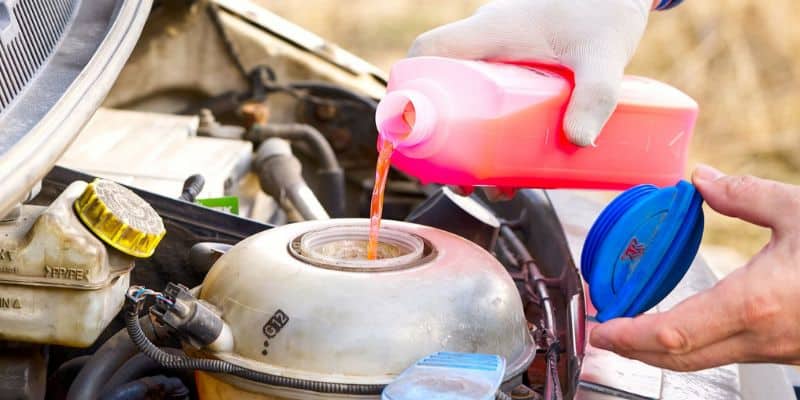In the realm of automotive maintenance, choosing the right coolant is crucial for maintaining optimal engine performance and preventing overheating. One popular coolant option is G12 coolant.
In this comprehensive guide, we will delve into the world of G12 coolant, exploring its composition, benefits, application, and best practices for usage.
Whether you’re a car enthusiast or a novice seeking to understand more about engine cooling, this article will provide you with valuable insights into G12 coolants.
What is G12 Coolant?
G12 coolant, also known as G12++ or G12 Plus, is an advanced engine coolant developed by leading automotive manufacturers.
It is primarily used in modern vehicles, especially those with aluminum engines.
G12 coolant is renowned for its exceptional heat transfer properties, superior corrosion protection, and extended service life.
G12 coolant is formulated using a hybrid organic acid technology (HOAT). This technology combines organic acids and silicate additives to create a coolant with excellent cooling capabilities and corrosion resistance.
The base of G12 coolant is typically ethylene glycol, a common coolant ingredient known for its effective heat transfer properties.
What color is G12 coolant?
G12 coolant is typically colored pink or purple. The exact color may vary slightly depending on the manufacturer, but it is commonly associated with a shade of pink or purple.
This distinctive color helps differentiate G12 coolant from other types of coolant and aids in identifying its presence in the cooling system.
Composition of G12 Coolant
To understand the effectiveness of G12 coolant, it’s important to examine its composition. G12 coolant is made up of a precise blend of ingredients that work together to provide optimal cooling and protection for the engine.
Components of G12 coolant
1. Ethylene Glycol: Ethylene glycol serves as the base of G12 coolant. It has a high boiling point and excellent heat transfer properties, allowing it to effectively absorb and dissipate heat from the engine.
2. Corrosion Inhibitors: G12 coolant contains specific corrosion inhibitors that protect the engine components from rust, scale, and corrosion.
These inhibitors form a protective layer on metal surfaces, preventing the formation of rust and extending the life of the engine.
3. Stabilizers: Stabilizers are added to G12 coolant to enhance its longevity and performance. They help maintain the pH balance of the coolant, preventing degradation and ensuring consistent cooling efficiency.
4. Deionized Water: G12 coolant is typically mixed with deionized water before use.
Deionized water is free from impurities, minerals, and contaminants that could potentially harm the engine. It helps dilute the concentrated coolant and ensures proper effectiveness.
The precise composition of G12 coolant may vary among different brands and manufacturers. However, the fundamental goal remains the same – to provide efficient cooling and protection for the engine.
How to tell if the coolant is G12?
To determine if the coolant in your vehicle is G12 coolant, you can follow these steps:
Check the coolant reservoir: Open the hood of your vehicle and locate the coolant reservoir. It is a translucent plastic tank usually marked with “coolant” or “antifreeze.”
Observe the coolant color: G12 coolant is typically pink or purple. Look at the coolant in the reservoir and compare it to the expected color of the G12 coolant. If it matches the pink or purple hue, there is a higher likelihood that it is a G12 coolant.
Check the labeling: G12 coolant containers often have labels indicating their specifications. Look for terms such as “G12,” “G12+,” “G30,” “VW TL 774-D/F,” or “Audi G12.” If you find any of these designations on the coolant container or in the vehicle’s documentation, it is likely G12 coolant.
Consult the vehicle manual or contact the manufacturer: If you are still unsure about the type of coolant in your vehicle, refer to the owner’s manual or contact the vehicle manufacturer or authorized service center. They can provide specific information on the recommended coolant type for your vehicle.
It’s essential to identify the coolant correctly to ensure the proper maintenance and compatibility with your vehicle’s cooling system. Using the wrong type of coolant can potentially lead to cooling system issues and damage.
Advantages of G12 Coolant
G12 coolant offers several advantages over traditional coolants. Its advanced formulation provides numerous benefits that improve engine performance and longevity.
1. Enhanced Heat Transfer
G12 coolant’s composition and formulation allow for efficient heat transfer from the engine to the coolant.
This helps maintain optimal operating temperatures and prevents overheating, which can lead to engine damage.
2. Superior Corrosion Protection
The corrosion inhibitors in G12 coolant create a protective barrier on metal surfaces, preventing rust and corrosion.
This protection extends the lifespan of engine components, reducing the risk of costly repairs.
3. Extended Service Life
G12 coolant typically has a longer service life compared to traditional coolants.
Its corrosion inhibitors and stabilizers help maintain its effectiveness for an extended period, reducing the frequency of coolant changes and associated maintenance costs.
4. Reduced Maintenance Intervals
Due to its extended service life, G12 coolant reduces the need for frequent coolant flushes and replacements.
This saves time and effort for vehicle owners and reduces the environmental impact associated with coolant disposal.
5. Compatibility with Various Engine Materials
G12 coolant is compatible with a wide range of engine materials, including aluminum, cast iron, and alloys. This makes it suitable for use in modern vehicles with diverse engine components.
When comparing G12 coolant to traditional coolants, several key differences come to light.
Traditional coolants, such as ethylene glycol-based coolants, lack some of the advanced features found in G12 coolants.
6. Corrosion Protection
G12 coolant offers superior corrosion protection to many traditional coolants. Its hybrid organic acid technology (HOAT) formulation, combined with specific corrosion inhibitors, helps prevent rust and corrosion on engine components.
7. Cooling Efficiency
G12 coolant’s composition and advanced formulation provide enhanced heat transfer capabilities.
This allows for efficient cooling and helps maintain optimal engine operating temperatures, reducing the risk of overheating.
8. Longer Service Life
G12 coolant typically has a longer service life compared to traditional coolants.
The corrosion inhibitors and stabilizers in G12 coolant help maintain its effectiveness over an extended period, reducing the need for frequent coolant changes.
9. More Compatibility
G12 coolant is designed to be compatible with various engine materials, including aluminum, cast iron, and alloys.
Traditional coolants may have specific compatibility requirements and limitations, making G12 coolant a versatile choice for modern vehicles.
It’s important to note that while G12 coolant offers numerous advantages, it’s essential to follow the manufacturer’s recommendations and guidelines for coolant selection and usage in your specific vehicle.

What cars use G12 coolant?
G12 coolant, also known as G12+ or VW G12 coolant, is primarily used by Volkswagen (VW) and Audi vehicles. These brands commonly recommend G12 coolant for their vehicles as it meets their specific coolant requirements.
In addition to VW and Audi, some other car manufacturers may also utilize G12 coolant or similar formulations in their vehicles. These manufacturers include Seat, Skoda, Bentley, Lamborghini, and Bugatti, which are all part of the Volkswagen Group.
It’s important to note that while G12 coolant is commonly associated with VW and Audi vehicles, it’s always recommended to consult the vehicle owner’s manual or contact the manufacturer directly to confirm the specific coolant requirements for your vehicle.
Proper Application of G12 Coolant
To maximize the benefits of G12 coolant and ensure optimal performance, proper application is key. Here are some important considerations when using G12 coolant:
1. Flushing the Cooling System
Before introducing G12 coolant, it’s crucial to flush the cooling system thoroughly. Flushing removes any remnants of old dirty coolant, debris, or contaminants that could affect the new coolant’s performance.
Follow the manufacturer’s guidelines or seek professional assistance to perform a proper cooling system flush.
2. Mixing Ratios and Dilution
G12 coolant is typically sold as a concentrated formula and needs to be mixed with deionized water before use.
It’s essential to follow the manufacturer’s recommended mixing ratios and dilution guidelines. Improper dilution can affect the coolant’s effectiveness and compromise cooling efficiency.
3. Compatibility with Different Vehicle Types
While G12 coolant is compatible with various engine materials, it’s essential to verify its compatibility with your specific vehicle.
Different manufacturers may have specific coolant requirements, and it’s advisable to consult the vehicle’s owner manual or contact the manufacturer for guidance.
Additionally, some vehicles may require specific coolant additives or supplements, especially those equipped with advanced cooling systems or components. Understanding and adhering to these requirements ensures the proper functioning of the cooling system.
G12 Coolant and Engine Corrosion Protection
One of the significant benefits of G12 coolant is its superior corrosion protection.
The corrosion inhibitors present in G12 coolant create a protective layer on metal surfaces, preventing the formation of rust, scale, and corrosion. This protection is essential for maintaining the longevity and performance of the engine.
Engine components, especially those made of aluminum, are susceptible to corrosion. G12 coolant’s advanced formulation helps safeguard these components, reducing the risk of damage and costly repairs.
By using G12 coolant, vehicle owners can enjoy peace of mind knowing that their engine is well-protected against corrosion-related issues.
G12 Coolant and Heat Transfer Efficiency
Efficient heat transfer is vital for maintaining optimal engine temperatures and preventing overheating. G12 coolant excels in this aspect due to its advanced composition and formulation.
The ethylene glycol base in G12 coolant has excellent heat transfer properties, allowing it to absorb and dissipate heat effectively.
This aids in maintaining the engine’s operating temperature within the desired range, even under demanding conditions.
G12 coolant’s ability to transfer heat efficiently helps prevent engine overheating, which can lead to severe damage and performance issues.
By using G12 coolant, vehicle owners can ensure that their engines stay cool and perform optimally, even in challenging driving situations.
Audi G12 coolant alternative
If you are looking for an alternative to Audi G12 coolant, there are a few options available.
While it is generally recommended to use the coolant specified by the manufacturer, there are compatible alternatives that can be used. Here are a couple of alternatives:
G13 Coolant
G13 coolant, also known as G13++ or VW G13, is the successor to G12 coolant. It is backward-compatible with G12 coolant and can be used as an alternative.
G13 coolant offers improved performance and longevity compared to G12 coolant. It provides excellent corrosion protection and is compatible with various engine materials.
Universal Coolants
There are universal coolants available in the market that are formulated to work with a wide range of vehicle makes and models. These coolants often meet the necessary specifications and requirements for Audi vehicles.
However, it is important to ensure that the universal coolant you choose complies with the necessary standards and is compatible with your specific Audi model.
When considering an alternative coolant, it is crucial to check the specifications and recommendations provided by the coolant manufacturer.
It is also advisable to consult the vehicle’s owner manual or contact the Audi dealership or authorized service center for their recommendations on compatible coolant options.
Can I use g12 coolant instead of g13?
While G12 and G13 coolants are both compatible with Audi vehicles, it is generally recommended to use the coolant specified by the manufacturer. Here are a few factors to consider:
Cooling System Compatibility: G13 coolant is backward-compatible with G12 coolant, meaning it can be used in systems designed for G12 coolant. However, using G12 coolant in a system designed for G13 may not provide the same level of performance and protection.
Longevity and Performance: G13 coolant offers improved performance and longevity compared to G12 coolant. It provides enhanced corrosion protection and is formulated to meet the specific requirements of modern engine designs. Using G12 coolant instead of G13 may compromise the coolant’s ability to provide optimal protection and performance.
Manufacturer’s Recommendations: Audi may specify the use of G13 coolant for certain models and production years. It is advisable to consult the vehicle’s owner’s manual or contact the Audi dealership or authorized service center to confirm the recommended coolant type for your specific vehicle.
Ultimately, while G12 coolant may be compatible with your Audi vehicle, using the recommended G13 coolant is generally the best practice to ensure optimal performance, longevity, and compatibility with the cooling system.
Frequently Asked Questions (FAQs)
1. Can G12 Coolant be Mixed with Other Coolants?
It is generally not recommended to mix G12 coolant with other coolant types. Mixing different coolant formulations can lead to chemical reactions that can degrade the coolant’s performance and potentially harm the engine.
To maintain the integrity of the coolant and ensure optimal performance, it is best to use G12 coolant exclusively.
2. How Often Should G12 Coolant Be Replaced?
The replacement interval for G12 coolant can vary depending on the manufacturer’s recommendations and driving conditions.
Generally, G12 coolant has a longer service life compared to traditional coolants, and it may last up to five years or 150,000 miles.
However, it is advisable to consult the vehicle’s owner manual or contact the manufacturer for specific replacement guidelines.
3. Is G12 Coolant Environmentally Friendly?
G12 coolant typically contains ethylene glycol, which is classified as toxic and harmful to the environment.
It is crucial to handle and dispose of G12 coolant responsibly, following local regulations and guidelines. Some manufacturers offer G12 coolants with low-toxicity additives, which can be a more environmentally friendly option.
4. Can G12 Coolant Improve Fuel Efficiency?
G12 coolant primarily focuses on engine cooling and corrosion protection rather than directly improving fuel efficiency.
However, by maintaining optimal engine temperatures and preventing overheating, G12 coolant indirectly contributes to efficient engine performance, which can positively impact fuel efficiency.
5. Is G12 Coolant Suitable for All Engine Types?
G12 coolant is generally suitable for a wide range of engine types, including gasoline, diesel, and hybrid engines.
However, it is essential to verify compatibility with the specific vehicle and consult the manufacturer’s recommendations to ensure proper usage.
Conclusion
G12 coolant offers exceptional cooling efficiency, superior corrosion protection, and extended service life. Its advanced hybrid organic acid technology (HOAT) formulation, combined with specific corrosion inhibitors, ensures that the engine stays cool and well-protected even in demanding conditions.
Proper application of G12 coolant, including flushing the cooling system, following recommended mixing ratios, and verifying compatibility with the vehicle, is crucial for optimal performance.

Joseph Morgan has decades of automotive experience. The Detroit native started restoring classics in the 1970s. He owned a vintage repair shop and authored articles for car magazines. With a 1965 Mustang fastback of his own, Joseph now shares advice through his YouTube channel. From engine swaps to rust repair, his expertise helps preserve automotive history.
